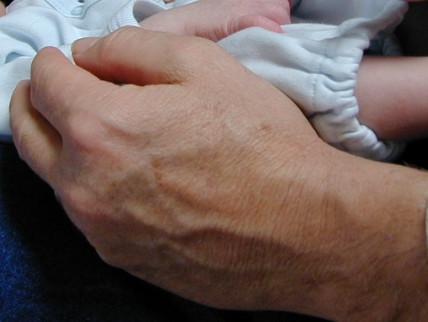“Sometimes I feel close to God and I want to read the Bible and pray.” She sighed. “But sometimes I don’t. Sometimes He feels far away. What If I die when I feel far away from Him? Will I go to hell?”
It was a big question. An honest one. Maybe you’ve asked similar questions.
Let me reassure you. Once we’ve stepped into a saving relationship with Jesus, we are His and no emotion or lack of emotion can change that.
This ebb and flow is a normal experience, especially in our early years as a believer. Our relationship with the Lord fluctuates more than it is steady. There are times when we are consistent with praying and reading the Bible and there will be times when we aren’t. There will be times when we feel close to God and times when He feels far away. It’s just the way it is.
For many years I operated under the assumption that God’s love for me depended on my behavior. I thought that if I was praying and reading my Bible every day, God was pleased with me.
But if I messed up, I believed God was mad at me and let me know by causing bad things to happen. I pictured God cheering for me on the sidelines when I was doing great spiritually and being distant and disappointed when I failed. In this view there was no room for making mistakes and certainly no compassion when I fell.
And I definitely fell.
But how could I fall? Jesus conquered sin and death on the cross. I should be able to live without being bogged down by sin. Right?
He did his part, I reasoned, but I wasn’t living up to mine. I felt like I was failing at being a Christian.
The truth? Jesus did defeat sin and broke the eternal claim it had on us. He rescued us from the clutches of His enemy in the greatest rescue mission ever.
And this is where we fail to tell new believers that our rescue comes with a price. We don’t explain how salvation causes us to switch sides in a cosmic battle, or how when we accept His rescue, His enemy is now our enemy. When we step into a relationship with Jesus, our souls are safe, but the enemy will try every way to keep us from growing closer to Jesus.
He is out to get us. And he will try to distract us in any way possible. This is called temptation.
When it comes to fighting temptation, the Christian life can feel like the lyrics of a Chumbawamba song. “I get knocked down, but I get up again, you’re never going to keep me down.”
But after a while, we wonder what if I don’t get up again, because this is exhausting.
When it comes to living the Christian life, we don’t talk enough about the pull of temptation – the absolute war that goes on inside of us – how to get back up when we’ve fallen, and what God thinks of us along the way.
The Pull of Temptation: The Struggle is Real
Everything broken in this world goes back to Genesis Chapter 3. If you’ve ever wondered how the Garden of Eden applies to your life today, buckle up! This is where brokenness began.
Simply put, Adam and Eve chose to believe Satan’s lies instead of God’s truth, which brought sin and brokenness into every person born after them. Their son, Cain, grew angry and jealous of his brother, Able.
Just as God went looking for Adam and Eve when they were hiding from Him after they sinned, God went to Cain. And just as he asked them “Where are you?” to begin a conversation, He asked Cain “Why are you angry?” even though He knew what Cain was thinking and feeling. Cain didn’t answer, but God offered him some advice – a warning that his parents had not had.
God said to him. “Sin is crouching at the door. Its desire is for you, but you must rule over it.”
In her Bible study, Good News, Caroline Saunders calls this the first definition of sin. In this one verse we learn two things about sin straight from God.
Sin is out to get you. God described sin to Cain as crouching, ready to pounce. The idea is of an animal ready to pounce on its prey. Think of wildlife videos and the tension that you feel when you see the cheetah hiding in the tall grass as the gazelle herd walks peacefully by. You know what’s about to happen and it’s not good.
We must rule over it. If Genesis 4:7 is the first definition of sin, it is also the first description of what we are to do with sin. We are to rule over it. The word used for rule is mashal which means to rule, to have dominion, to have power over.
This would have been a perfect time for Cain to ask a few questions. “What do you mean?” “How do I do that?” And most importantly, “Can you help me?”
But Cain chose his own way, and instead of ruling sin, it ruled him.
God told Cain that he must rule over sin, but the truth was that Cain was powerless to rule over it on his own. He needed God’s help. Like Cain, we can’t fight sin on our own. And, like Cain, we find ourselves being ruled by it.
What should we do when we fall? Is there a way out?
Getting Back Up Again
When we give in to temptation, we expect God to deal with us the way people respond when we’ve disappointed them. But if we feel like God is disappointed in us, we will avoid Him. See how sneaky the enemy is? He tells us lies about God to keep us from running to God because he knows that we will find forgiveness in His arms.
Thankfully, Cain isn’t the only example the Bible gives us of responding to sin.
David was a man who knew God. He also knew about being ruled by sin and about getting back up again. Even though he was God’s man, he fell to some serious sins: lust, adultery, lying, murder (2 Samuel 11-12). There were consequences in David’s life due to those sins, but there was also a way back.
David wrote Psalm 51 as he repented for these sins. You see, the way to get back up is to run to God. Getting back up is found in repentance, in turning away from sin and turning back toward God. Later in his life David wrote Psalm 19. In verse 13, he is an older, wiser man as he prays these words:
Keep your servant also from willful sins; may they not rule over me.
David used the word mashal in this verse. He asks God to help him, in essence, asking God to rule over him. “David comes under the rule of the Lord to prevent sin from mashal-ing him. He does not want to make the same mistake Cain does.” (Steve Phillips Livingwordin3d.com)
When we give into temptation, when we fall, the way to get back up is to run to God. Running toward God does not come naturally to us. After all, we’ve broken His rules and ignored His warnings. Surely He is furious at us, or at the very least thinks that we deserve to suffer. This is exactly what the enemy wants us to think.
What God Thinks When We Fail
Remember that picture of God cheering for me on the sidelines when I was doing great and being distant when I failed? My view of God was skewed. Caroline Saunders says, “If we don’t know God, we assume he is like the world.” We assume that because the world is all we know. Thankfully, God’s response is filled with compassion and mercy.
God was never on the sidelines in my life or in yours. Jesus left heaven and jumped on that field, lived in this broken world, experienced everything you and I experience. He is on the field, in the middle of our messy lives. He is with us. And if He is with us, then we are not alone.
Hebrews 4:15-16 tells his thoughts toward us:
For we do not have a high priest who is unable to sympathize with our weaknesses, but one who in every respect has been tempted as we are, yet without sin. Let us then with confidence draw near to the throne of grace, that we may receive mercy and find grace to help in time of need.
These words are open arms. We can hear him saying, “I know the brokenness. I know the pull of sin. Let’s walk through this together.”
He helps us fight temptation because we can’t fight it without his help. And He draws us back in when we’ve fallen. He helps us up and He draws us back in. Every. Single. Time. And each time we get up again, we fight harder out of thankfulness, instead of an effort to earn His love. Knowing that we are not facing difficulties alone, but that God is with us, builds our faith.
That is the Christian life in this broken world. We get knocked down and He helps us up again.
But it doesn’t end there. There is a day coming when he will make all things right, and when sin will not exist. Until then, we can have courage and lean closer to our compassionate Savior, because we are not fighting alone. He is always with us.





 The adoption process is filled with mountains of paperwork, moments of doubt, and uncertainty that all will work out. An adoptive family needs a network of friends who will pray for them, encourage them, and help them raise the necessary finances.
The adoption process is filled with mountains of paperwork, moments of doubt, and uncertainty that all will work out. An adoptive family needs a network of friends who will pray for them, encourage them, and help them raise the necessary finances.


 God is on His Throne
God is on His Throne










